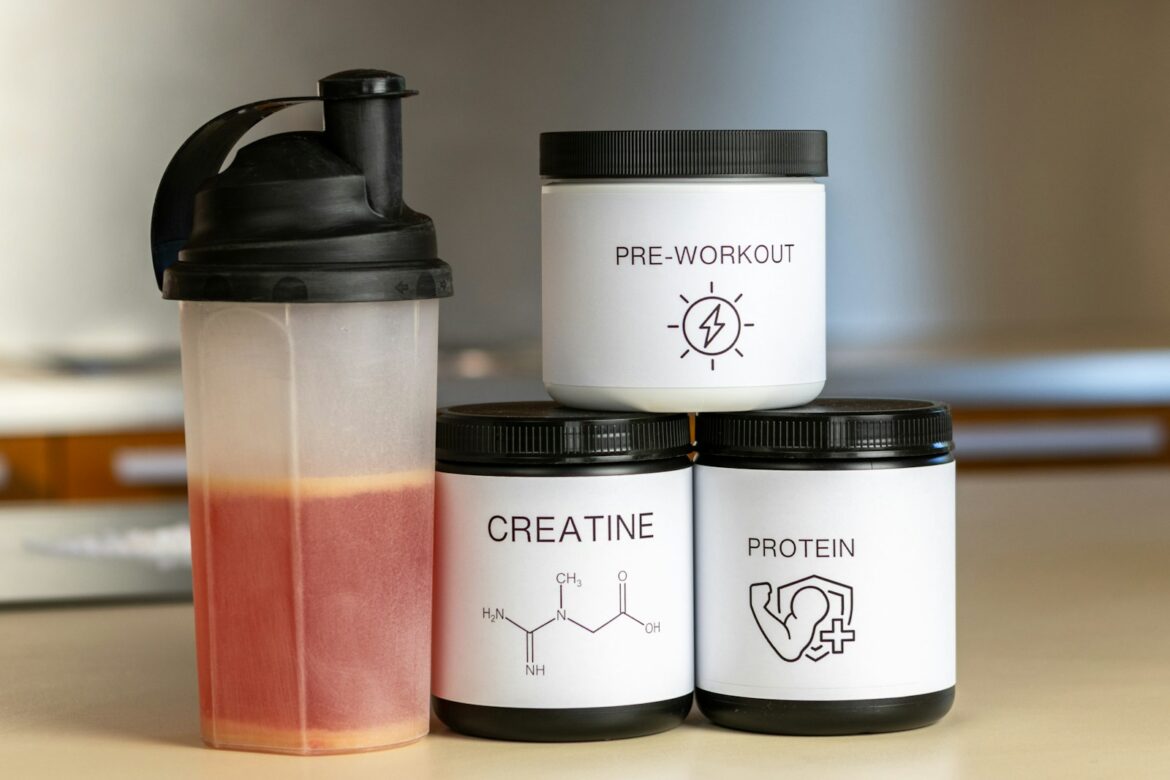The Elimination of This Myth Regarding Creatine and Calories
Besides the work in fitness and nutrition, creatine supplements move memories and discussions, and they also question whether they can affect calorie intake.
Let us walk through the lines of this relationship in order to lay bare the believing and unbelievable in this case.
Comprehending the Essence of Creatine
Creatine is a natural product found in muscle cells and is regarded as a major and useful component of the body’s energy system. It contributes immensely in replenishing the adenosine triphosphate (ATP), a molecule that drives energy at a cellular level, during brief periods when the body is severely engaged in intensive workouts.
What is Creatine?
Skeletal muscles predominantly serve as the storage sites for creatine which is synthesized from amino acids in the liver, kidneys, and pancreas.
It functions as a fast source of energy by giving phosphate groups to ADP (adenosine diphosphate), restoring ATP (adenosine triphosphate) from elements, and thus, fueling muscle contractions.
Creatine Supplements
A wide range of creatine supplements mark the market, e.g. creatine monohydrate, creatine ester ethyl, and creatine hydrochloride. Every one of them has its growth rate, efficiency, and benefits.
Separation from the Perception: Is Creatine Making You Look Bigger?
Creating enhancements is often mistaken for their abilities to produce large and visible gains in lean muscle due to which oftentimes they are met with the concern of undesirable bulkiness.
Investigating the Effect of Creatine on the Body’s Water Balance
Along with creatine’s frequently examined link to water retention that results in bloating and weight gain, concerns about water retention are among the major speculations in these discussions.
Understanding our Body’s Function Through Water Retention.
Water retention within the muscle cells, capable of that is mainly because of creatine properties, which are more osmotic, is the result of creatine supplementation.
On the other hand, this mass activation is restrained to muscle tissues and cannot produce widespread edema.
The Scientific Investigations on Creatine and Water Retention
Many papers have been published which provide evidence for creatine intake and water retention mechanism, leading to the immense discovery of its impact on the performance of athletes.
Creatine – Fact or Fake: Does Creatine Lead to Weight Gain?
Creatine supplements acquire notoriety as massive weight gain providers, at times being wrongly mistaken as body fat accumulation, triggers persuasions and hesitation in the minds of potential users.
One has to Learn Why Weight Gain Occurs.
The general weight gain connected to the usage of creatine is due to cellular water retention and the increased glycogen storage of the muscle, but not to fat deposition.
The Influence of Creatine on Muscle Development is Under Investigation
Numerous studies have been carried out to determine the capacity of creatine supplements to accelerate the growth rate of muscle mass and strength, essentially, the magnum opus of most athletes and gym-goers.
Discussing the Energetic Question of Creatine
The calorie-free nature of creatine supplementation leads to reflecting on the fact of its possible impact not directly on the calorie balance but on the energy expenditure and metabolic processes.
A Calorie Comparison of Creatine
Creatine supplements are usually filled in with a negligible amount of calories, mainly because creatine molecules with minimal additional ingredients compose them.
Caloric Expenditure Ought to be Looked into and Creatine Employed
Despite creatine supplements not contributing calories directly, increased performance by ergogenic effects of exercise may indirectly add up some caloric expenditure or metabolic demand in workouts.
FAQs:
Q: Which kind of creatine form is most effective?
The predominant form of creatine, the borate-free creatine monohydrate, has the best absorption rate and a higher percentage of creatine uptake in muscles than other creatine forms.
Q: What is the particular function of creatine in the system that produces the energy?
Creatine speeds up ATP production, and therefore, can continue muscle workings even during strenuous activities such as weightlifting or sprinting, without getting too tired.
Q: Can all weight gains due to creatine be considered fat or muscle?
Creatine’s tonic weight increase is chiefly due to the lean muscle mass and the water accumulation inside skeletal cells, not because of fat tissue growth.
Q: Is fluid accumulation due to the use of creatine supplementation a cause for alarm?
The transient water-retention principle is normally harmless and reversible upon creatine intake in recommended dosages and hence does not pose any kind of health risks.
Q: Is creatine a weight-gaining substance?
Pure creatine supplements contain very few calories so they will not provide energy calories to the body.
Q: What do studies show regarding the connection between creatine supplements and increases in water retention?
Research unfailingly shows that the consumption of creatine supplements leads to an increase in intramuscular water retention that, in turn, can contribute to the improvement of muscle cell hydration and better exercise performance as well as faster recovery.
Q: What impact does creatine have, in terms of energy output, during workouts?
Creatine improves anaerobic energy mechanisms and the amount of protracted exercise, which can be translated into more calories spent in those intense training sessions.
Q: By what mechanism creatine supplementation is related to muscle size?
Creatine acts as a cellular energy booster and stimulates protein synthesis which is important for gaining an increased time and a new maximum load.
Conclusion: Deciphering Creatine and The Corresponding Caloric Effect
To summarize, creatine supplementation bears out many advantages of which quicker muscle building and enhanced athletic performance without a large increase in caloric intake or expenditure is the major highlight.
Recognizing the mechanisms through which creatine causes muscle increases as well as water retention and fat gain may confirm most misguided beliefs and help people to make decisions about its use that are data-supported.

Curtis Walcker
Supplement Consultant
Hey there! I’m Curtis Walcker, a dietary supplement expert with a passion for all things fitness and nutrition. Armed with a Master of Science degree in nutrition. I’ve spent years diving into the nitty-gritty of regulatory affairs, scientific research, and product development in the supplement industry. Read More

